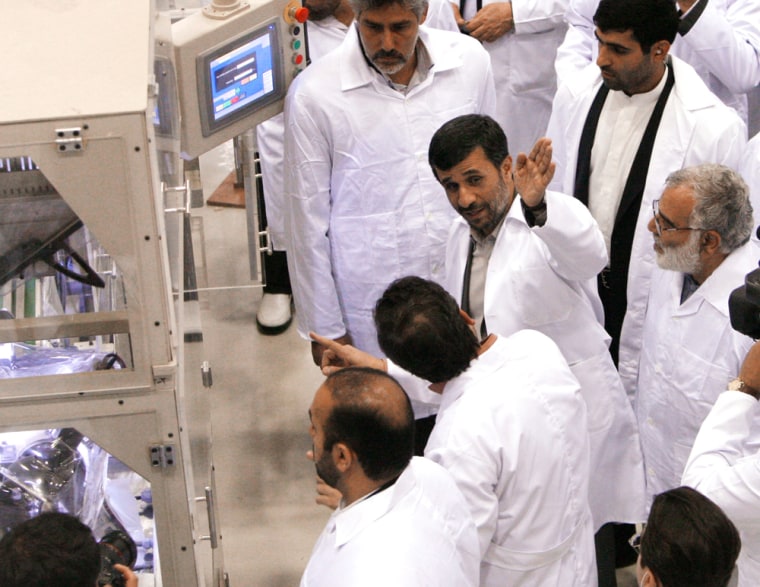Iran's president said Thursday his country is open to talks with the U.S. and other countries over its nuclear program. But he insisted the talks must be based on respect for Iran's rights, suggesting the West should not try to force Tehran to stop uranium enrichment.
Hard-liner Mahmoud Ahmadinejad said Iran would present a new proposal for negotiations, saying "conditions have changed" — an apparent reference to President Barack Obama's election and Iran's own progress in its nuclear program since previous talks with Iran were held last year. He did not elaborate on the proposal.
Iran has been tepid in its response to Obama's offers of dialogue, but in recent days Ahmadinejad has appeared to warm up. Earlier this week, he said he was ready for dialogue if Obama was "honest" in his intentions. Ahmadinejad's speech Thursday made clear he saw a difference between Obama and his predecessor, former President George W. Bush, who took a tough stance on Iran.
Ahmadinejad spoke during celebrations for Iran's Nuclear Day, in which a number of nuclear advances were announced.
Among them, officials said the number of centrifuges at Iran's enrichment facility has increased to 7,000 — up from 6,000 announced in February — and that a new, more advanced type of centrifuge has been tested. Ahmadinejad also inaugurated a new plant for developing uranium fuel for a planned hard-water reactor.
The United States announced Wednesday that it would join direct talks with Iran that Britain, China, France, Germany and Russia are seeking to convene. The talks aim to break a long deadlock over Iran's nuclear program, which the U.S. and its allies fear aims to build a nuclear weapon. Iran denies the charge.
The Bush administration generally shunned such nuclear talks with Iran, though it sent a diplomat to the last round of talks last year.
'Peaceful activities'
Ahmadinejad said past negotiations failed because "they were insisting on stopping our peaceful activities, they were trying to impose that."
"The Iranian nation has always been for talks," Ahmadinejad said. But, he said, "dialogue has to be based on justice and respecting rights. ... Justice means both sides are treated equally and bilateral rights are respected."
The United Nations has demanded Iran halt uranium enrichment, a process that can produce nuclear fuel but also the material for a warhead. Iran has refused, saying it has a right to develop peaceful nuclear technology.
In past talks, European nations backed by Washington offered a package of economic incentives for Tehran to suspend enrichment. Iran rejected it and countered with its own "package," but U.S. and European officials said its proposals were unclear.
On Thursday, Ahmadinejad said Iran would adapt its proposals. "Today conditions have changed. We had presented a package. Given new world developments, new subjects need to be added to the package," he said, without elaborating.
Thursday's ceremony celebrated the National Day of Nuclear Technology, the day in 2006 when Iran first enriched uranium at its facility in the town of Natanz. Since then, it is believed to have enriched enough uranium to build a bomb — though first the uranium would have to be more highly enriched, and it is not known if Iran has perfected such techniques. Iran says the enriched uranium is for its first domestically produced nuclear plant, due to open in several years.
Nuclear advances
In the enrichment process, uranium gas is pumped into a series of thousands of centrifuges, which spin it at super-sonic speeds to remove impurities. Uranium enriched to a low degree is used to fuel a light-water nuclear reactor, but when enriched to a high degree it produces the basis of a warhead.
Vice President Gholam Reza Aghazadeh, who is also the nuclear chief, announced to the gathering the increased number of centrifuges and the new, more advanced version.
Ahmadinejad said the new centrifuge has been tested, and has several times more capacity more than the P-1 centrifuges currently used at Natanz. Neither gave details or said when it might be brought into use.
Ahmadinejad also said the country has inaugurated a new facility producing uranium fuel for a heavy-water nuclear reactor that is under construction in the town of Arak and is expected to be completed in 2009 or 2010.
Heavy-water reactors use a different process than light-water ones, but have their own nuclear proliferation concerns. The West fears Iran could eventually reprocess spent fuel from the heavy-water reactor to produce plutonium for a warhead.
Journalist held
Also Thursday, an Iranian judge ordered detained American journalist Roxana Saberi to go to trial next week on spying charges. Saberi, who grew up in Fargo, N.D., and is a dual citizen of the U.S. and Iran, has been living in Iran for six years. She has reported from there for several news organizations, including National Public Radio and the British Broadcasting Corp.
An investigative judge involved in the case told state TV that Saberi was passing classified information to U.S. intelligence services, an accusation that State Department spokesman Robert Wood said Thursday was "baseless" and "without foundation."
"What we want to see Iran do is to release Roxana Saberi so that she can go back to her family," he said. "We'd like to see her released as a humanitarian gesture."
